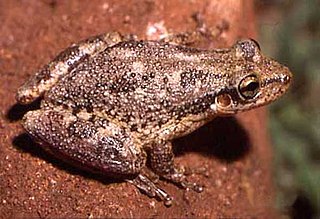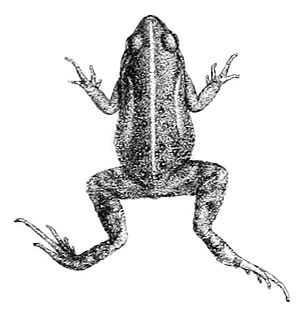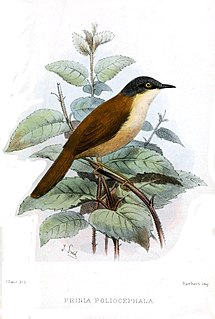The Sudanian grass rat is a species of rodent in the family Muridae. It is found in Burkina Faso, Guinea-Bissau, Mali, Niger, Senegal, possibly Benin, possibly Ivory Coast, possibly Ghana, possibly Guinea, and possibly Togo. Its natural habitats are subtropical or tropical dry shrubland, subtropical or tropical moist shrubland, subtropical or tropical dry lowland grassland, subtropical or tropical seasonally wet or flooded lowland grassland, arable land, pastureland, rural gardens, irrigated land, seasonally flooded agricultural land, and canals and ditches.

The African common toad or guttural toad is a species of toad in the family Bufonidae. It is found in Angola, Botswana, Democratic Republic of the Congo, Kenya, Lesotho, Malawi, Mauritius, Mozambique, Namibia, Réunion, Somalia, South Africa, Ethiopia, Swaziland, Tanzania, Zambia, and Zimbabwe. Its natural habitats are subtropical or tropical dry forest, subtropical or tropical moist lowland forest, subtropical or tropical moist montane forest, dry savanna, moist savanna, temperate shrubland, subtropical or tropical dry shrubland, subtropical or tropical moist shrubland, subtropical or tropical dry lowland grassland, subtropical or tropical seasonally wet or flooded lowland grassland, subtropical or tropical high-altitude grassland, intermittent rivers, freshwater lakes, intermittent freshwater lakes, freshwater marshes, intermittent freshwater marshes, arable land, pastureland, rural gardens, urban areas, heavily degraded former forest, ponds, and canals and ditches.

Scinax nasicus is a species of frog in the family Hylidae. It is found in Argentina, Bolivia, Brazil, Paraguay, and Uruguay. Its natural habitats are subtropical or tropical dry forests, moist savanna, temperate shrubland, subtropical or tropical dry shrubland, subtropical or tropical moist shrubland, subtropical or tropical high-altitude shrubland, temperate grassland, subtropical or tropical seasonally wet or flooded lowland grassland, freshwater lakes, intermittent freshwater lakes, freshwater marshes, arable land, pastureland, plantations, rural gardens, heavily degraded former forest, water storage areas, ponds, and canals and ditches.

Hyperolius acuticeps is a species of frogs found in Burundi, the Democratic Republic of the Congo, Ethiopia, Kenya, Malawi, Mozambique, Rwanda, Somalia, South Africa, Sudan, Tanzania, Uganda, Zambia, and Zimbabwe, and possibly Botswana, the Central African Republic, Chad, Namibia, and Swaziland. Its natural habitats are dry savanna, moist savanna, temperate shrubland, subtropical or tropical moist shrubland, temperate grasslands, subtropical or tropical dry lowland grasslands, subtropical or tropical seasonally wet or flooded lowland grasslands, subtropical or tropical high-altitude grasslands, rivers, swamps, freshwater lakes, freshwater marshes, urban areas, heavily degraded former forests, water storage areas, and ponds. It is threatened by habitat loss.
Hyperolius mariae is a species of frog in the family Hyperoliidae. It is found in Democratic Republic of the Congo, Kenya, Tanzania, and Zambia. Its natural habitats are dry savanna, moist savanna, subtropical or tropical dry shrubland, subtropical or tropical moist shrubland, subtropical or tropical dry lowland grassland, subtropical or tropical seasonally wet or flooded lowland grassland, rivers, swamps, freshwater lakes, intermittent freshwater lakes, freshwater marshes, intermittent freshwater marshes, arable land, pastureland, rural gardens, urban areas, water storage areas, ponds, open excavations, irrigated land, seasonally flooded agricultural land, and canals and ditches.
Hyperolius pyrrhodictyon is a species of frog in the family Hyperoliidae. It is endemic to Zambia. Its natural habitats are dry savanna, moist savanna, subtropical or tropical dry shrubland, subtropical or tropical moist shrubland, subtropical or tropical dry lowland grassland, subtropical or tropical seasonally wet or flooded lowland grassland, rivers, swamps, freshwater lakes, intermittent freshwater lakes, freshwater marshes, intermittent freshwater marshes, arable land, pastureland, urban areas, heavily degraded former forest, water storage areas, ponds, open excavations, irrigated land, seasonally flooded agricultural land, and canals and ditches.

The common reed frog is a species of tree frogs in the family Hyperoliidae found in Burundi, the Democratic Republic of the Congo, Ethiopia, Kenya, Rwanda, Sudan, Tanzania, and Uganda, and possibly the Central African Republic, Chad, and Eritrea. Its natural habitats are subtropical or tropical dry forest, subtropical or tropical moist lowland forest, subtropical or tropical moist montane forest, dry savanna, moist savanna, subtropical or tropical dry shrubland, subtropical or tropical moist shrubland, subtropical or tropical seasonally wet or flooded lowland grassland, subtropical or tropical high-altitude grassland, rivers, swamps, freshwater lakes, intermittent freshwater lakes, freshwater marshes, intermittent freshwater marshes, freshwater springs, arable land, pastureland, rural gardens, urban areas, heavily degraded former forests, water storage areas, ponds, irrigated land, seasonally flooded agricultural land, and canals and ditches.

Leptodactylus fuscus is a species of frog in the family Leptodactylidae. Its local names are rana picuda and rana silbador.

Leptodactylus gracilis is a species of frog in the family Leptodactylidae. It is found in Argentina, Bolivia, Brazil, Paraguay, and Uruguay. Its natural habitats are subtropical or tropical moist shrubland, temperate grassland, subtropical or tropical dry lowland grassland, subtropical or tropical seasonally wet or flooded lowland grassland, intermittent freshwater marshes, pastureland, rural gardens, and urban areas.

Physalaemus biligonigerus is a species of frog in the family Leptodactylidae. It is found in Argentina, Bolivia, Brazil, Paraguay, and Uruguay. Its natural habitats are subtropical or tropical dry forests, temperate shrubland, subtropical or tropical dry shrubland, subtropical or tropical moist shrubland, temperate grassland, subtropical or tropical dry lowland grassland, subtropical or tropical seasonally wet or flooded lowland grassland, freshwater lakes, intermittent freshwater lakes, freshwater marshes, sandy shores, arable land, pastureland, plantations, rural gardens, urban areas, heavily degraded former forest, water storage areas, ponds, irrigated land, seasonally flooded agricultural land, and canals and ditches.
Pleurodema bufoninum, the large four-eyed frog or sapo de cuatro ojos grandes, is a species of frog in the family Leptodactylidae. It is found in Argentina and Chile. Its natural habitats are subantarctic forests, temperate forests, subantarctic shrubland, temperate shrubland, subtropical or tropical dry shrubland, subantarctic grassland, temperate grassland, intermittent rivers, swamps, intermittent freshwater marshes, arable land, rural gardens, ponds, and open excavations. The common name "four-eyed frog" refers to two inguinal poison glands that resemble eyes. When threatened, the frog lowers its head and raises its rear. When the frog adopts this posture, the poison glands are also raised toward the predator. The predator may also confuse the frog's raised posterior for the head of a larger animal.
Pleurodema guayapae is a species of frog in the family Leptodactylidae. It is found in Argentina and Bolivia. Its natural habitats are temperate shrubland, subtropical or tropical dry shrubland, subtropical or tropical dry lowland grassland, subtropical or tropical seasonally wet or flooded lowland grassland, intermittent freshwater marshes, and pastureland.
Pleurodema tucumanum is a species of frog in the family Leptodactylidae. It is endemic to Argentina. Its natural habitats are temperate shrubland, subtropical or tropical dry shrubland, intermittent freshwater marshes, arable land, pastureland, seasonally flooded agricultural land, and canals and ditches.

The Boettger's dainty frog or common caco is a species of frog in the family Pyxicephalidae. It is found in Botswana, Ethiopia, Kenya, Lesotho, Mozambique, Namibia, Rwanda, South Africa, Swaziland, Tanzania, Zambia, Zimbabwe, possibly Angola, and possibly Uganda. Its natural habitats are dry savanna, moist savanna, subtropical or tropical dry shrubland, subtropical or tropical moist shrubland, subtropical or tropical dry lowland grassland, subtropical or tropical seasonally wet or flooded lowland grassland, subtropical or tropical high-altitude grassland, swampland, intermittent freshwater lakes, intermittent freshwater marshes, arable land, pastureland, plantations, rural gardens, ponds, seasonally flooded agricultural land, and canals and ditches.

Phrynobatrachus mababiensis or the Mababe puddle frog is a species of frog in the family Phrynobatrachidae. It is found in Angola, Botswana, Democratic Republic of the Congo, Kenya, Malawi, Mozambique, Namibia, South Africa, Swaziland, Tanzania, Zambia, Zimbabwe, possibly Ethiopia, possibly Sudan, and possibly Uganda.
Peters' platanna is a species of frog in the family Pipidae found in Angola, Botswana, the Republic of the Congo, the Democratic Republic of the Congo, Gabon, Namibia, Zambia, Zimbabwe, and possibly Tanzania. Its natural habitats are subtropical or tropical moist lowland forests, dry savanna, moist savanna, subtropical or tropical dry shrubland, subtropical or tropical moist shrubland, subtropical or tropical dry lowland grassland, subtropical or tropical seasonally wet or flooded lowland grassland, subtropical or tropical high-altitude grassland, rivers, intermittent rivers, swamps, freshwater lakes, intermittent freshwater lakes, freshwater marshes, intermittent freshwater marshes, freshwater springs, arable land, pastureland, rural gardens, urban areas, heavily degraded former forests, water storage areas, ponds, open excavations, and canals and ditches.

The crowned bullfrog is a species of frog in the family Dicroglossidae. It is found in the Sub-Saharan Africa . Its natural habitats are subtropical or tropical moist lowland forest, dry savanna, moist savanna, subtropical or tropical dry shrubland, subtropical or tropical moist shrubland, subtropical or tropical dry lowland grassland, subtropical or tropical seasonally wet or flooded lowland grassland, rivers, intermittent rivers, freshwater lakes, intermittent freshwater lakes, freshwater marshes, intermittent freshwater marshes, freshwater springs, arable land, pastureland, rural gardens, heavily degraded former forest, and ponds.

The Mascarene grass frog, or Mascarene ridged frog, is a species of frog in the family Ptychadenidae. It is found in sub-Saharan Africa, Madagascar, and Mauritius.

The Schilluk ridged frog is a species of frog in the family Ptychadenidae. It is found in Angola, Burkina Faso, Cameroon, Democratic Republic of the Congo, Egypt, Eritrea, Ethiopia, Ghana, Kenya, Malawi, Mozambique, Senegal, Somalia, Sudan, and Tanzania. Its natural habitats are dry savanna, moist savanna, subtropical or tropical dry shrubland, subtropical or tropical dry lowland grassland, subtropical or tropical seasonally wet or flooded lowland grassland, rivers, freshwater lakes, freshwater marshes, intermittent freshwater marshes, arable land, ponds, seasonally flooded agricultural land, and canals and ditches.

The grey-crowned prinia is a species of bird in the family Cisticolidae. It is found in Bhutan, northern India and Nepal. Its natural habitats are subtropical or tropical dry forest, subtropical or tropical moist shrubland, subtropical or tropical dry lowland grassland, subtropical or tropical seasonally wet or flooded lowland grassland, and arable land. It is threatened by habitat loss.













